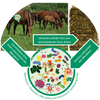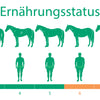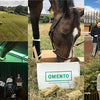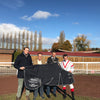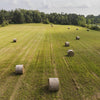Microbiome: How OMENTO has a positive effect on your horse's intestines
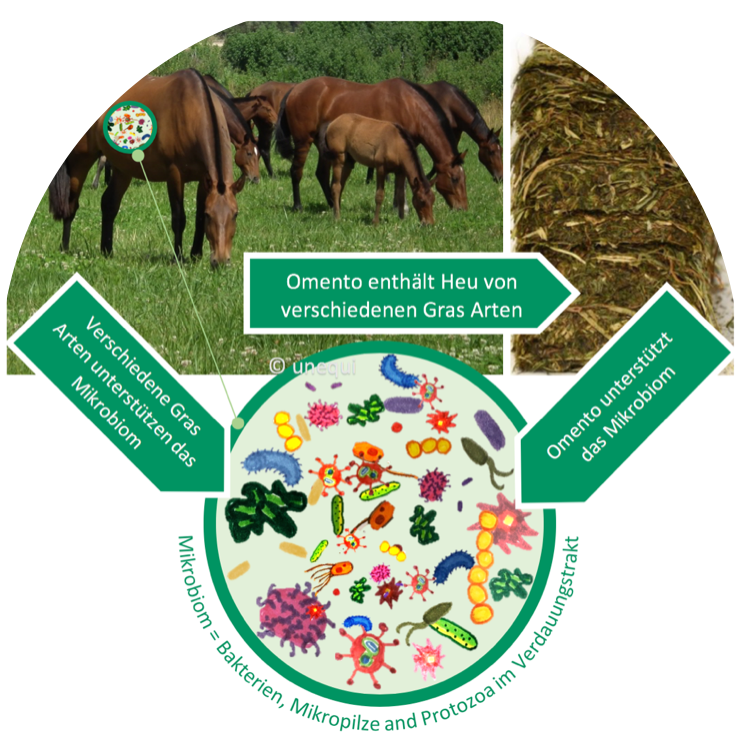
The horse is a herbivore and its digestive tract functions through a symbiosis with microorganisms present throughout the gut. They increase greatly in the hindgut. The collection of bacteria, microfungi and protozoa is collectively known as the horse's microbiome. In evolutionary terms, the horse's digestive system has become the perfect environment for these microbes, which do this by breaking down complex carbohydrates such as cellulose and hemicellulose through fermentation and converting plant matter into short-chain fatty acids. These fatty acids then provide the energy a horse needs. As with all things, there are good microbes and not so good microbes.
The microbiome, size and composition depend very much on the food substrates it receives.
PREbiotics can be thought of as easily digestible carbohydrates (e.g. sugars and starches) that could "supply" additional energy to the microbiome. A small amount of oats with roughage therefore promotes microbial fermentation a bit. However, the digestive tract of horses is not designed to handle large amounts of sugars and starches, and the type of bacteria that feed on these create an acidic and sometimes "toxic" environment for the rest of the microbiome. Commercial prebiotic supplements therefore use small amounts of more complex starches in the hope that they will "survive" the foregut and then have a positive effect on the hindgut microbiome. If fermented in the stomach, this can lead to increased acidity and disruption of protective mechanisms, which can lead to ulcers. A recent study by Gatter et al. (2019) has shown that prebiotics can already affect the microbiome in the stomach, although there were no adverse effects due to high feed intake causing the feed to pass faster overall. Feeding horses a diet high in roughage containing multiple plant species naturally supports a healthy microbiome in the gut. A mixed grass pasture therefore provides the perfect "prebiotic" through the natural sugars and fiber in the plant matter. But, not all horses can graze and stabled horses use feeds that are often derived from single-crop cultivation. Omento contains preserved roughage from various grasses and a concentrate ingredient that mimics the natural "prebiotic" diet of horses.
PRObiotics not only provide food substrate for bacteria, but also contain strains of bacteria. They have become popular for feeding horses because research on ruminants, such as cows, has shown a positive effect on the microbiome. However, in ruminants, the fermentation center is at the front, whereas horses' fermentation center is at the back of the digestive tract and everything must first pass through the highly acidic stomach. There, it is likely to be broken down before it can support a healthy microbiome for fermenting feed in the hindgut. Because of this, there is little consistency in finding positive results due to probiotics in horses, but no harmful effects have been reported either.

The most important fact in maintaining a healthy microbiome is maintaining a consistent diet high in roughage, containing a variety of plant species and keeping the horse busy and chewing for long periods when it cannot go out to pasture. Omento is designed to provide horses with natural pre- and probiotics in the diet without the need for additional supplements of this type.
"This supports the microbiome and makes Omento more cost-effective."

Dr Andrea D. Ellis is a renowned scientist and researcher in equine science. She runs her own company UNEQUI, Science & Creativity. She is passionate about animal nutrition, animal welfare and good science and biology education. Andrea teaches and researches in the areas of animal nutrition, behaviour, welfare and ethics at various universities, eg University of Edinburgh, Nottingham Trent University and on ANIVADO.com. She is also a member of the Accreditation Panel of the Royal Society of Biology.

